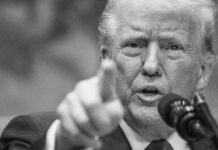“Before the first case of coronavirus spread within the United States, President Trump took the unprecedented step of suspending all travel from China,” Pence said in a speech from Fort McHenry National Monument on the third night of the Republican National Convention.
“That action saved an untold number of American lives,” he said. “And bought us time to launch the greatest national mobilization since World War II.”
National Review’s John McCormack:
The speech, which lasted around half an hour, was a remarkable effort by Pence to sound victorious.
As leader of the Trump administration’s pandemic response, Pence was in a unique position to address the highly infectious virus that has touched the life of nearly every American.
He spoke first about President Trump’s foreign policy achievements and judicial appointments – but then launched into a discussion of the pandemic that made it sound like the U.S. has already won the struggle.
The speech wasn’t all misleading; there were indeed some bright spots in the administration’s response. There were sufficient ventilators to care for the seriously ill. There was a major increase in testing, after a long delay. Hospitals in most places weren’t overrun with patients, with the possible exception of New York City. And Trump has signed a number of economic relief packages, though Congress went home recently without extending such aid.
Pence noted all these steps. But what he didn’t mention was the summer’s overall rise in infections, hospitals and deaths, an employment rate around 10 percent and a school year that is starting only virtually for many students. There are persistent supply chain problems hindering labs and medical centers from further ramping up testing.
Ronald Klain, who served as former poresident Barack Obama’s “Ebola czar”:
New Yorker staff writer Susan Glasser:
He also claimed the administration forged “seamless partnerships with governors across America in both parties,” despite reports of frustration by governors feeling the White House wasn’t responding to their needs.
New York Times reporter Alex Burns:
It wasn’t the first time Pence tried to declare mission accomplished.
In a June 16 Wall Street Journal op-ed, the vice president declared “we are winning the fight against the invisible enemy.” Yet since then, another 59,000 people have died of covid-19. The U.S. death rate is still hovering around 1,000 fatalities a day.
Pence also projected an optimistic tone for the future last night, pointing to rapid progress in developing a vaccine and improved, life-extending treatment for covid-19 patients.
“In the days ahead, as we open up America again and open up America’s schools, I promise you we’ll continue to put the health of America first,” he said.
“And as we work to bring this economy back, we all have a role to play and we all have a choice to make.
On November 3rd, you need to ask yourself: Who do you trust to rebuild this economy?” he said. “The choice is clear to bring America all the way back, we need four more years of President Donald Trump in the White House.”
Pence did express empathy for victims of the contagion.
Except for first lady Melania Trump, few speakers at the RNC have acknowledged the pandemic’s massive health, economic and emotional toll on Americans. But Pence acknowledged the loss of life and thanked the nation’s medical workers.
“But tonight, our hearts are with all the families who have lost loved ones,” Pence said. “We mourn with those who mourn, and we grieve with those who grieve.”
He praised two first responders in the audience at Ft. McHenry: nurse Veronica Saez and her brother, firefighter William.
“They’re emblematic of heroes all across this country,” Pence said. “You’ve earned the admiration of your fellow Americans, and the thanks of a grateful nation.”
A few hours earlier, fractures over testing emerged in the task force Pence leads.
Anthony S. Fauci, director of the National Institute of Allergy and Infectious Diseases, told CNN he is “concerned” about revised guidance from the Centers for Disease Control about who should get tested for the virus.
The CDC now says those who came into contact with someone infected “do not necessarily need a test” if they don’t exhibit symptoms. The new direction replaces prior guidance that everyone who has been in close contact with an infected person should get tested.
Brett Giroir, who oversees the testing effort, insisted to reporters “all the docs” signed off on the changes after they were debated for a month.
But Fauci contradicted that account in a statement he gave to CNN’s Sanjay Gupta.
“I was under general anesthesia in the operating room last Thursday and was not part of any discussion or deliberation regarding these new testing recommendations,” the statement said. “I am concerned about the interpretation of these recommendations and worried it will give people the incorrect assumption asymptomatic spread is not of great concern. In fact, it is.”
Giroir said he and CDC Director Robert Redfield led the charge on changing the guidance, based on concerns that people can have misleading negative results if the test is given too early. But experts raised concerns similar to Fauci’s:
“Several leading infectious-disease experts predicted that, after months of public health exhortations encouraging people to get tested, the turnaround could heighten public confusion, impede contact tracing and lead to more cases,” The Post’s Amy Goldstein and Lena H. Sun report.
“The CDC estimates that 40 percent of those who test positive for the coronavirus have no symptoms but may be highly infectious and spread it to other people,” they note.
Other Republican speakers barely mentioned the pandemic last night.
There was no acknowledgement of the coronavirus by second lady Karen Pence or Kellyanne Conway, the longtime Trump advisor who just announced her exit.
Sen. Amy Klobuchar (D-Minn.):
White House press secretary Kayleigh McEnany made a passing reference to people with preexisting conditions, roundly mischaracterizing the Trump administration’s approach to protecting them.
In a speech where she spoke about testing positive for a genetic mutation linked to breast cancer, she claimed Trump “stands by Americans with preexisting conditions.”
Yet the Department of Justice, under Trump, is refusing to defend the Affordable Care Act from a lawsuit brought by GOP-led states. A landmark part of the ACA was its requirement that insurers cover people with preexisting conditions and not charge them more. Millions of Americans could lose those protections if the Supreme Court strikes down the law.
The Washington Post’s Philip Bump:
Trip Gabriel, reporter for the New York Times:
Correction: A previous version of The Health 202 incorrectly stated the U.S. death toll per person exceeds that of every other advanced economy. Ten other countries – including Belgium, the United Kingdom, Spain, Italy and Sweden – have higher per capita death rates. We regret the error.
Ahh, oof and ouch
AHH: Texas hospitals prepared for Hurricane Laura despite extra hurdles from the coronavirus pandemic.
“Evacuations were more cumbersome with the added requirements of social distancing and masks because of the coronavirus. But critically ill patients have been transferred from hospitals and frail patients are out of nursing homes in Jefferson County, Tex.,” Lenny Bernstein reports. The hurricane made landfall in the early hours of Thursday morning.
Medical Center of Southeast Texas in Port Arthur, one of several large hospitals in the region with experience dealing with hurricanes, transferred nearly two-thirds of patients to hospitals farther inland. Patients receiving kidney dialysis were all moved out of concerns that disruptions in the water supply could interrupt their treatment.
Jefferson County also helped move 1,000 nursing home residents in buses, which were limited to less than half of their usual capacity to prevent spread of the coronavirus.
“There comes a moment when you’ve prepared the best you can. It’s beyond your control, and you adapt to it as it comes,” Ryan Miller, the chief operating officer for Christus Southeast Texas Health System, told Lenny.
OOF: Trump trolls Biden by calling for drug tests before the presidential debates.
Trump suggested that Biden had an unusually strong debate performance against Sen. Bernie Sanders of Vermont during the Democratic primary because the former vice president might have been on drugs (there is no evidence at all this is the case).
“If you go back and watch some of those numerous debates, he was so bad. He wasn’t even coherent. And against Bernie, he was,” Trump told the Washington Examiner. “And we’re calling for a drug test,” he added.
It’s not the first time Trump has called for drug testing before a debate. In 2016 he suggested then-nominee Hillary Clinton had been on drugs during their second debate. Trump provided no evidence for either claim.
But in the case of Biden, the aspersion fits into a broader pattern of Trump attacks aimed at casting doubt on the mental fitness of this year’s Democratic nominee, who he routinely calls “Sleepy Joe.”
Some Trump critics thought that the tactic could backfire, while others suggested Biden should set his own preconditions.
Never Trump conservative and political commentator Bill Kristol:
OUCH: The coronavirus pandemic has pushed rural hospitals to the brink of closure.
“As COVID-19 continues to spread, an increasing number of rural communities find themselves without their hospital or on the brink of losing already cash-strapped facilities,” Kaiser Health News’s Sarah Jane Tribble reports.
Before the pandemic, rural hospitals were already stretched thin. A record 18 hospitals closed in 2019. Since then, another 14 have closed in the first half of 2020. Experts say that more would have closed if it weren’t for grants and loan money approved by Congress through the Cares Act.
But now many hospitals have already gone through that relief money and are unsure how they will pay back federal loans, even as they are bracing for a possible increase in coronavirus cases over the winter. Of the 1,300 small critical care hospitals across the United States, 859 took advantage of Medicare loans.
“For us, this was survival money and we spent it already,” Paul Taylor, the chief executive of a 25-bed hospital in northwestern Arkansas, told Kaiser Health News.
A $5 coronavirus test that returns results in minutes received emergency use authorization from the Food and Drug Administration.
The FDA granted an emergency use authorization to Abbott Laboratories for the rapid-response test, which can be administered at a doctor’s office or a school nurse’s office.
“The emergency approval comes as demand grows for greater access to Covid-19 diagnostic tools that deliver results in minutes, rather than days to help quickly contain infections,” the Wall Street Journal’s Sarah Krouse reports. Some public health officials say that low-cost rapid tests will be crucial as workplaces and schools reopen.
Politico’s Alexander Gaffney:
The card-like test uses a technology similar to that is used in home pregnancy tests to search for virus proteins in samples taken from a nasal swab. The antigen test accurately detects about 97 percent of positive cases, but is not thought to be as sensitive as some lab tests.
Abbott Laboratories has said that it intends to ship millions of the tests across the country in September and plans to ramp up production to 50 million tests in October. Production at that level could double the number of tests in the United States compared to June, Sarah reports.
Scott Gottlieb, former commissioner of the FDA:
A top FDA official says he will quit if political interference leads to a rushed and unproven coronavirus vaccine.
“Scientists, public health officials and lawmakers are worried that the Trump administration will pressure the FDA to authorize a COVID-19 vaccine in advance of the November presidential election, even if data from clinical trials do not support its widespread use,” Reuters’s Dan Levine and Marisa Taylor reports.
Peter Marks, the director of the FDA’s Center for Biologics Evaluation and Research, said he would resign if the Trump administration approved a vaccine before it was properly tested. The comment came during a vaccine working group call last week.
Marks, a career official who will be central to the approval of any vaccine, told Reuters that he has not faced any political pressure so far.
The concerns come amid fears that political interference may have played a role in the agency’s decision to grant an emergency use authorization for blood plasma to treat the coronavirus, despite objections from some top scientists.
Michael Caputo, a top spokesman at the Department of Health and Human Services, said that speculation about political interference in the vaccine development “only undermines confidence in the public health system.”
Coronavirus latest
- Four sleep-away camps in Maine successfully used face masks, physical distancing and bubbles to prevent the spread of the virus among more than 1,000 campers and staff members, according to a new federal study. Their experience could serve as a potential road map as public health officials look for safe ways to reopen schools, Lena H. Sun reports.
- Experts have raised doubts about a coronavirus disinfectant that was granted emergency authorization by the Environmental Protection Agency on Monday. The maker of the disinfectant, Dallas-based Allied BioScience, claims that it kills the virus on surfaces for up to a week. But some public health officials worry that the disinfectant — set to be used by American Airlines and two Texas sports clinics — could create a false sense of security and might have harmful health effects, Steven Mufson and Meryl Kornfield report.
- Older men infected with the coronavirus are twice as likely to get sick and die as women of the same age. A new study suggests that women might be protected by a stronger immune response, a finding that could have implications for any vaccination program, the Times’s Apoorva Mandavilli reports.
- A disproportionate number of the more than 1,000 health-care workers killed by the virus have been people of color or immigrants (regardless of race), according to a joint investigation by the Guardian’s Danielle Renwick and Kaiser Health News’s Shoshana Dubnow.
Elsewhere in health care
A woman infected with HIV in 1992 may be the first to recover from the retrovirus without medical treatment.
“The woman is Loreen Willenberg, 66, of California, already famous among researchers because her body has suppressed the virus for decades after verified infection,” the Times reports. Only two other people have ever been declared cured of HIV, and both underwent grueling bone-marrow transplants.
The case was documented in a new study published in the journal Nature that also looked at dozens of other people whose bodies appear to be able to control HIV infections without anti-retrovirals — a phenomenon thought to occur in fewer than 1 percent of people infected.
Researchers believe they may have identified a possible mechanism for how this works: HIV inserts itself into the human genome, but in a very small number of people it seems that the virus may be locked in regions of the genome where it cannot reproduce. In the case of Willenberg, scientists could find no evidence of HIV in her body.
“I think that is a novel, an important discovery,” Sharon Lewin, director of the Peter Doherty Institute for Infection and Immunity in Melbourne, told the Times. “The real challenge, of course, is how you can intervene to make this relevant to the 37 million people living with H.I.V.”
U.S. diplomats hit back against a U.N. panel finding that the country restricted abortion during the pandemic.
“The U.S. government on Wednesday denied a United Nations panel’s accusation that states have restricted abortion access during the COVID-19 pandemic, and rejected the notion that there is an assumed ‘right to abortion,’ ” the Hill’s Nathaniel Weixel reports.
The U.S. mission in Geneva was responding to a letter from a the U.N. Working Group on Discrimination Against Women, which alleged that U.S. states had used the coronavirus pandemic as an excuse to restrict abortion access.
“As United Nations human rights mandate holders, you are undoubtedly aware that international human rights law does not recognize any ‘right to abortion,’ ” diplomats in the U.S. Mission to Geneva wrote. “The United States is disappointed by and categorically rejects this transparent attempt to take advantage of the COVID-19 pandemic to assert the existence of such a right.”








